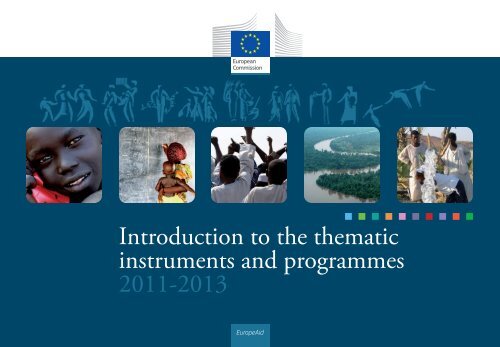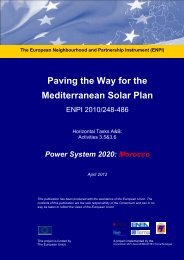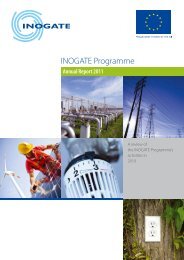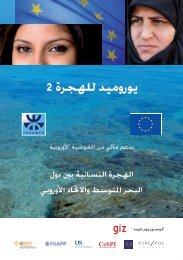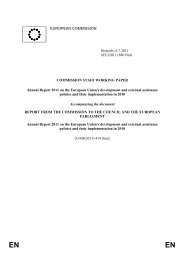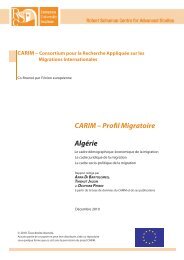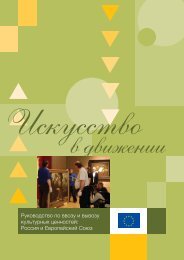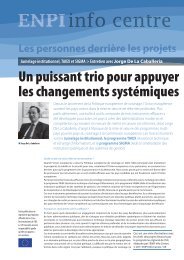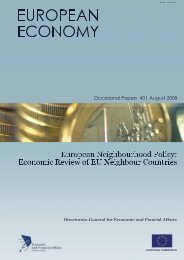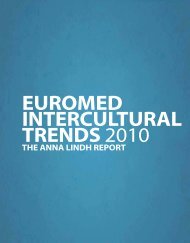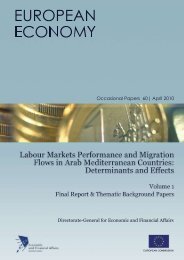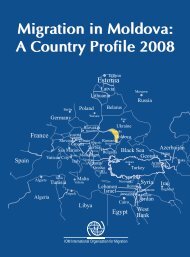Introduction to the thematic instruments and programmes 2011-2013
Introduction to the thematic instruments and programmes 2011-2013
Introduction to the thematic instruments and programmes 2011-2013
You also want an ePaper? Increase the reach of your titles
YUMPU automatically turns print PDFs into web optimized ePapers that Google loves.
<strong>Introduction</strong> <strong>to</strong> <strong>the</strong> <strong>the</strong>matic<br />
<strong>instruments</strong> <strong>and</strong> <strong>programmes</strong><br />
<strong>2011</strong>-<strong>2013</strong><br />
EuropeAid
<strong>Introduction</strong> <strong>to</strong> <strong>the</strong> <strong>the</strong>matic<br />
<strong>instruments</strong> <strong>and</strong> <strong>programmes</strong><br />
<strong>2011</strong>-<strong>2013</strong><br />
3
European Commission<br />
EuropeAid External Cooperation Office<br />
Rue de la Loi 41, B-1049 Brussels<br />
E-mail: europeaid-info@ec.europa.eu<br />
Internet<br />
http://eeas.europa.eu/index_en.htm<br />
http://ec.europa.eu/europeaid/index_en.htm<br />
http://ec.europa.eu/europeaid/how/finance/index_en.htm<br />
http://www.un.org/millenniumgoals<br />
4<br />
The brochure on <strong>the</strong> <strong>instruments</strong> <strong>and</strong> <strong>the</strong>matic <strong>programmes</strong> (<strong>2011</strong>–13)<br />
is available in French, English, Spanish <strong>and</strong> Arabic.<br />
Luxembourg: Publication office.<br />
ISBN:<br />
KQ-70-07-070-EN-C<br />
© European Union, 2012<br />
All pho<strong>to</strong>graphic rights reserved by <strong>the</strong> EU.<br />
Reproduction authorised, providing <strong>the</strong> source is acknowledged.<br />
Printed in Belgium, (MONTH) 2012<br />
PRINTED ON RECYCLED PAPER
Edi<strong>to</strong>rial<br />
In <strong>2011</strong>, <strong>the</strong> Commission adopted two Communications.<br />
One on European Union development policy, ‘The agenda for change’<br />
<strong>and</strong> <strong>the</strong> o<strong>the</strong>r on budget support, ‘The future approach <strong>to</strong> EU budget<br />
support <strong>to</strong> third countries’. We have outlined in this brochure how EU<br />
development policy will look in <strong>the</strong> future. Our intention is <strong>to</strong> have a<br />
modern policy, better equipped <strong>to</strong> <strong>to</strong> face <strong>the</strong> challenges of of a rapidly a changing changing<br />
global global environment.<br />
All <strong>the</strong> ac<strong>to</strong>rs involved in <strong>the</strong>matic <strong>programmes</strong> continue <strong>to</strong> play a major<br />
role in development.<br />
I would like <strong>to</strong> <strong>to</strong> underline <strong>the</strong> <strong>the</strong> special place place of civil of civil society society <strong>and</strong> <strong>and</strong> local local au-<br />
authorities in in <strong>the</strong>ir <strong>the</strong>ir commitment <strong>to</strong> <strong>to</strong> promote governance.<br />
Building on <strong>the</strong> ‘Structured Dialogue’ with with civil civil society society <strong>and</strong> <strong>and</strong> local local au-<br />
authorities conducted in 2010 in 2010 <strong>and</strong> <strong>and</strong> <strong>2011</strong>, <strong>2011</strong>, <strong>the</strong> EU <strong>the</strong> will EU streng<strong>the</strong>n will streng<strong>the</strong>n its links its<br />
with links with civil civil society society organisations, social social partners <strong>and</strong> local authorities,<br />
through regular dialogue <strong>and</strong> implementation of best practices. The EU<br />
will also support <strong>the</strong> emergence of organised local civil societies equipped<br />
<strong>to</strong> act as a watchdog <strong>and</strong> trusted partner in dialogue with national<br />
governments. The EU must also continue <strong>to</strong> consider ways of mobilising<br />
local authorities’ expertise, for example through networks of excellence<br />
or twinning exercises.<br />
Civil society organisations <strong>and</strong> international organisations are <strong>the</strong><br />
primary ac<strong>to</strong>rs of most of <strong>the</strong> <strong>the</strong>matic <strong>programmes</strong> managed by EU.<br />
Their actions reflect our long-term commitment <strong>to</strong> peoples of all nations.<br />
Freedom, democracy, <strong>the</strong> rule of law, respect for human rights, solidarity<br />
<strong>and</strong> social cohesion are founding principles of <strong>the</strong> European Community<br />
<strong>and</strong> form <strong>the</strong> basis for our relations with <strong>the</strong> world.<br />
This brochure presents an introduction <strong>to</strong> all <strong>the</strong> <strong>the</strong>matic <strong>instruments</strong><br />
<strong>and</strong> <strong>programmes</strong> in which <strong>the</strong>se ac<strong>to</strong>rs can play <strong>the</strong>ir role.<br />
M.F. Fotiadis<br />
Direc<strong>to</strong>r General<br />
5
6<br />
Table of contents<br />
Instruments <strong>and</strong> <strong>the</strong>matic <strong>programmes</strong> ......................7<br />
EU financing mechanisms ................................ 8<br />
Millennium Development Goals. .......................... 10<br />
The Instrument for Development Cooperation (DCI) . . . . . . . . . . . . 11<br />
Non-State Ac<strong>to</strong>rs <strong>and</strong> Local Authorities in development . . . . . . . . . . .. . 12<br />
The environment <strong>and</strong> natural resources ................... 16<br />
Migration <strong>and</strong> asylum . ................................. 18<br />
Food security . ........................................ 20<br />
Investing in people.. .................................... 21<br />
– Good health for all . .................................... 22<br />
– Education, knowledge <strong>and</strong> skills. ......................... 24<br />
– Gender equality . ...................................... 25<br />
– O<strong>the</strong>r areas of human <strong>and</strong> social development ................ 28<br />
The European Instrument for Democracy <strong>and</strong> Human Rights ... . 30<br />
– Democracy <strong>and</strong> human rights .......................... . . 31<br />
– Support for Human Rights Defenders ................. . . . . 32<br />
The Instrument for Stability (IfS) ....................... . . . 34<br />
The Instrument for Nuclear Safety Cooperation (INSC) . ....... . 35<br />
What is <strong>the</strong> role of <strong>the</strong> European Union delegations .............<br />
for NSA-LA <strong>and</strong> EIDHR? ............................... . 36<br />
Support <strong>to</strong> civil society in geographical <strong>programmes</strong> . . . . . . . . . . . . . 37<br />
How <strong>to</strong> obtain funding from <strong>the</strong> European Commission? ....... 38<br />
How civil society organisations can get a grant? .............. 39
Instruments <strong>and</strong> <strong>the</strong>matic<br />
<strong>programmes</strong><br />
What’s a <strong>the</strong>matic programme?<br />
The results of European financed <strong>the</strong>matic <strong>programmes</strong> are found all over <strong>the</strong><br />
world. These <strong>programmes</strong> are all about protecting human rights, promoting<br />
democracy, eradicating poverty, self-sufficiency in food production, education<br />
<strong>and</strong> on ecological <strong>and</strong> health-related projects. Thematic <strong>programmes</strong><br />
are always implemented using a horizontal approach, <strong>and</strong> are supported by<br />
national <strong>and</strong> regional cooperation <strong>programmes</strong> drawn up by <strong>the</strong> Commission.<br />
In contrast <strong>to</strong> geographical <strong>programmes</strong>, EU <strong>the</strong>matic <strong>programmes</strong> are more<br />
widely opened <strong>to</strong> European <strong>and</strong> local civil society organisations <strong>and</strong> local<br />
authorities, international non-government organisations, etc.<br />
Each <strong>the</strong>matic programme is regulated on <strong>the</strong> basis of a decision made by<br />
<strong>the</strong> European Parliament <strong>and</strong> <strong>the</strong> Council of <strong>the</strong> EU, which specify <strong>the</strong> priorities<br />
<strong>and</strong> funding for a period of two or three years. The current programming<br />
period covers in most cases <strong>2011</strong>-13.<br />
Civil society: at <strong>the</strong> heart of Commission <strong>programmes</strong><br />
Non-State Ac<strong>to</strong>rs play a prominent role in delivering services <strong>to</strong> <strong>the</strong> poorest as well<br />
as education <strong>and</strong> advocacy. They also act as a watchdog for public engagement.<br />
Most <strong>the</strong>matic <strong>programmes</strong> are open <strong>to</strong> contributions from <strong>the</strong> various civil society<br />
organisations. Non-State Ac<strong>to</strong>rs are privileged partners of <strong>the</strong> Commission as,<br />
besides <strong>the</strong> support from which <strong>the</strong>y may benefit under <strong>the</strong> geographical <strong>instruments</strong>,<br />
<strong>the</strong>y are <strong>the</strong> principal beneficiaries of <strong>the</strong> <strong>the</strong>matic <strong>programmes</strong> such as:<br />
• “Non-State Ac<strong>to</strong>rs <strong>and</strong> local authorities in development”: a programme destined<br />
solely for <strong>the</strong>m;<br />
• “European Instrument for Democracy <strong>and</strong> Human Rights”: civil society organisations<br />
are seen as key players in promoting human rights as well as participative<br />
<strong>and</strong> representative democracy.<br />
As one of <strong>the</strong> world’s leading donors for development, <strong>the</strong> European Commission<br />
plays a key role in facilitating Non-State Ac<strong>to</strong>rs <strong>and</strong> civil society’s<br />
participation in development cooperation. The EU contributes between<br />
EUR 800 million <strong>and</strong> 1 billion per year for <strong>the</strong> financing of Non-State Ac<strong>to</strong>rs<br />
<strong>and</strong> civil society organisations. Most of <strong>the</strong>se funds are mostly channelled<br />
through <strong>the</strong>matic budget lines.<br />
7
EU financing mechanisms<br />
An instrument provides <strong>the</strong> legal basis for <strong>the</strong> implementation of geographic<br />
<strong>and</strong> <strong>the</strong>matic <strong>programmes</strong>. Within <strong>the</strong> 2010-<strong>2013</strong> financial perspectives, <strong>the</strong><br />
EU has 7 <strong>instruments</strong> for external cooperation <strong>and</strong> channelling external aid.<br />
Thematic Instruments<br />
8<br />
European Instrument for Democracy <strong>and</strong> Human Rights (EIDHR)<br />
The European Instrument for Democracy <strong>and</strong> Human Rights (EIDHR) aims <strong>to</strong><br />
help establish democracy, <strong>the</strong> rule of law, <strong>and</strong> <strong>the</strong> protection of human rights <strong>and</strong><br />
basic freedoms. It is designed <strong>to</strong> complement <strong>the</strong> o<strong>the</strong>r <strong>instruments</strong> available<br />
for ensuring <strong>the</strong> implementation of related EU policies, which range from political<br />
dialogue <strong>to</strong> diplomatic procedures, via various <strong>instruments</strong> of financial <strong>and</strong><br />
technical cooperation – including <strong>the</strong> geographical <strong>and</strong> <strong>the</strong>matic <strong>programmes</strong>.<br />
It also supplements <strong>the</strong> interventions associated with crisis situations, which is<br />
also part of <strong>the</strong> Instrument for Stability.<br />
Instrument for Stability (IfS)<br />
The Instrument for Stability aims <strong>to</strong> streng<strong>the</strong>n security in partner countries where<br />
<strong>the</strong>re is an actual or emerging crisis (short-term component). It also guarantees<br />
security in stable countries (long-term component).<br />
The Instrument for Nuclear Safety Cooperation (INSC)<br />
The Instrument for Nuclear Safety Co-operation (INSC) promotes a high level<br />
nuclear safety, radiation protection <strong>and</strong> <strong>the</strong> application of efficent <strong>and</strong> effective<br />
safeguards of nuclear material in non-EU countries worldwide.
Geographical Instruments<br />
Instrument for Development Cooperation (DCI)<br />
The Instrument for Development Cooperation (DCI) replaces <strong>the</strong> array of<br />
geographical <strong>and</strong> <strong>the</strong>matic <strong>instruments</strong> created over time. It encompasses<br />
cooperation with partner countries <strong>and</strong> regions, namely: Latin America, Asia,<br />
Central Asia, <strong>the</strong> Middle-East <strong>and</strong> South Africa. The second DCI component<br />
consists of <strong>the</strong> five <strong>the</strong>matic <strong>programmes</strong> discussed in this brochure (in orange<br />
on <strong>the</strong> diagram). The third pillar of <strong>the</strong> DCI regulation is a series of secondary<br />
measures favouring <strong>the</strong> 18 ACP signa<strong>to</strong>ries <strong>to</strong> <strong>the</strong> Sugar Pro<strong>to</strong>col, which aim<br />
<strong>to</strong> provide support during <strong>the</strong>ir adjustment phase in <strong>the</strong> face of new market<br />
conditions linked <strong>to</strong> <strong>the</strong> reform of Community arrangements regarding sugar.<br />
European Development Fund (EDF)<br />
Based on <strong>the</strong> Co<strong>to</strong>nou Agreement, <strong>the</strong> linchpin of European Union cooperation<br />
with <strong>the</strong> African, Caribbean <strong>and</strong> Pacific (ACP) countries, <strong>the</strong> European<br />
Development Fund provides aid for 79 ACP partner countries of <strong>the</strong> Union<br />
<strong>and</strong> for <strong>the</strong> overseas countries <strong>and</strong> terri<strong>to</strong>ries of member states. The tenth<br />
European Development Fund entered in<strong>to</strong> force in January 2008.<br />
Instrument for Pre-accession Assistance (IPA)<br />
This pre-accession instrument provides assistance <strong>to</strong> countries directly in line<br />
<strong>to</strong> become members of <strong>the</strong> European Union (such as Macedonia, Turkey <strong>and</strong><br />
Croatia) <strong>and</strong> <strong>the</strong> Balkan countries (Albania, Serbia, Kosovo, Bosnia-Herzegovina<br />
<strong>and</strong> Montenegro).<br />
European Neighbourhood <strong>and</strong> Partnership Instrument (ENPI)<br />
The Neighbourhood region refers <strong>to</strong> countries covered by <strong>the</strong> European<br />
Neighbourhood Policy: Algeria, Armenia, Azerbaijan, Belarus, Egypt, Georgia,<br />
Lebanon, Libya, Jordan, Israel, Republic of Moldova (hereafter Moldova), Morocco,<br />
Syria, Tunisia, Ukraine, West Bank <strong>and</strong> <strong>the</strong> Gaza Strip. Russia is added<br />
<strong>to</strong> this list when we are speaking about <strong>the</strong> Partnership Instrument (ENPI).<br />
The ENPI presents an innovative cross-border co-operation, under which <strong>the</strong><br />
ENPI finances joint <strong>programmes</strong>, bringing <strong>to</strong>ge<strong>the</strong>r regions of Member States<br />
<strong>and</strong> partner countries sharing a common border.<br />
9
Millennium<br />
Development Goals<br />
The Millennium Development Goals (MDGs) are eight international<br />
development goals that all 193 United Nations member states <strong>and</strong> at<br />
least 23 international organisations have agreed <strong>to</strong> achieve by <strong>the</strong> year<br />
2015. The aim of <strong>the</strong> MDGs is <strong>to</strong> encourage development by improving<br />
social <strong>and</strong> economic conditions in <strong>the</strong> world’s poorest countries.<br />
10<br />
The Millennium Development Goals adopted in 2000 by <strong>the</strong> United Nations serve<br />
as a guide for European cooperation policy.<br />
The 8 MDGs are:<br />
Goal 1: Eradicate extreme poverty <strong>and</strong> hunger;<br />
Goal 2: Achieve universal primary education;<br />
Goal 3: Promote gender equality <strong>and</strong> empower women;<br />
Goal 4: Reduce child mortality;<br />
Goal 5: Improve maternal health;<br />
Goal 6: Combat HIV/AIDS, malaria <strong>and</strong> o<strong>the</strong>r diseases;<br />
Goal 7: Ensure environmental sustainability;<br />
Goal 8: Develop a global partnership for development.
The Instrument for<br />
Development Cooperation<br />
(DCI)<br />
In cooperation with partner countries <strong>and</strong> <strong>the</strong> international community, <strong>the</strong><br />
European Commission is doing much <strong>to</strong> achieve <strong>the</strong> Millennium Development<br />
Goals, in particular through <strong>the</strong> Instrument for Development Cooperation (DCI).<br />
This instrument reaffirms <strong>the</strong> goals in development cooperation policy, namely,<br />
<strong>the</strong> reduction of poverty, sustainable economic <strong>and</strong> social development <strong>and</strong><br />
<strong>the</strong> gradual <strong>and</strong> harmonious integration of developing countries in<strong>to</strong> <strong>the</strong> world<br />
economy.<br />
11<br />
In addition <strong>to</strong> providing assistance in different parts of <strong>the</strong> world, <strong>the</strong> DCI brings<br />
<strong>to</strong>ge<strong>the</strong>r <strong>the</strong> five <strong>the</strong>matic <strong>programmes</strong> which aim <strong>to</strong> address different global challenges,<br />
such as environmental protection, questions of demographic movement<br />
<strong>and</strong> food security. These five <strong>programmes</strong> are outlined on <strong>the</strong> following pages.<br />
This document is presenting <strong>the</strong> current structure of <strong>programmes</strong> for <strong>the</strong> period<br />
<strong>2011</strong>-<strong>2013</strong>. The next Multiannual Financial Framework 2014-2020 (MFF) will see<br />
<strong>the</strong> reinforcement of <strong>the</strong> interaction between <strong>the</strong>se <strong>programmes</strong> <strong>and</strong> <strong>instruments</strong><br />
with geographic <strong>programmes</strong>. The new approach <strong>to</strong> development cooperation<br />
reflected in <strong>the</strong> “Agenda for Change” underlines <strong>the</strong> need <strong>to</strong> increase <strong>the</strong> impact<br />
of EU aid by concentrating EU assistance with a better concentration <strong>and</strong><br />
complementary principles.
Non-State Ac<strong>to</strong>rs <strong>and</strong> local authorities in development<br />
The primary aim of this new programme is <strong>to</strong> streng<strong>the</strong>n <strong>the</strong> abilities of Non-State<br />
Ac<strong>to</strong>rs <strong>and</strong> Local Authorities <strong>to</strong> provide help. It also serves <strong>to</strong> co-finance actions in<br />
areas as diverse as rural development, health, environmental protection <strong>and</strong> education,<br />
as well as long-term partnerships between civil society <strong>and</strong> local authorities.<br />
12<br />
Non-State Ac<strong>to</strong>rs <strong>and</strong> Local<br />
Authorities in development<br />
Solidarity with citizens<br />
Supporting Non-State Ac<strong>to</strong>rs <strong>and</strong> Local Authorities means encouraging local<br />
participation in development, at both national <strong>and</strong> local level. It also means<br />
working for better governance <strong>and</strong> more participative development which is thus<br />
more relevant <strong>to</strong> citizens.<br />
These organisations are a real benefit given <strong>the</strong>ir proximity <strong>to</strong> local communities<br />
<strong>and</strong> <strong>the</strong>ir greater flexibility when it comes <strong>to</strong> implementation. This is why <strong>the</strong><br />
European Commission has supported <strong>the</strong>ir involvement for many years in <strong>the</strong><br />
development process, in particular as regards <strong>the</strong> new <strong>the</strong>matic programme<br />
“Non-State Ac<strong>to</strong>rs <strong>and</strong> Local Authorities in development”.<br />
These initiatives may be grouped according <strong>to</strong> <strong>the</strong> following three major<br />
objectives:<br />
• Supporting actions aimed at a democratic, cohesive <strong>and</strong> au<strong>to</strong>nomous society<br />
in partner countries by enhancing <strong>the</strong> capacities of Non-State Ac<strong>to</strong>rs <strong>and</strong> Local<br />
Authorities, supporting populations with no access <strong>to</strong> resources or basic services<br />
<strong>and</strong> excluded from <strong>the</strong> political decision-making process, <strong>and</strong> favouring<br />
dialogue between State <strong>and</strong> Non-State Ac<strong>to</strong>rs;<br />
• Financing awareness-raising <strong>and</strong> educational initiatives among <strong>the</strong> European<br />
population on <strong>the</strong> <strong>to</strong>pic of development, by encouraging a better underst<strong>and</strong>ing<br />
of <strong>the</strong> stakes involved <strong>and</strong> stronger involvement of all in <strong>the</strong> fight against<br />
poverty <strong>and</strong> more balanced relations between <strong>the</strong> differing regions of <strong>the</strong> world;<br />
• Facilitating coordination <strong>and</strong> communication between local authority networks<br />
<strong>and</strong> civil society stakeholders, both involved in <strong>the</strong> European public debate on<br />
development.<br />
Total budget for <strong>the</strong> period <strong>2011</strong>-<strong>2013</strong>: EUR 702 million.<br />
http://ec.europa.eu/europeaid/how/finance/dci/non_state_ac<strong>to</strong>rs_en.htm
Non-State Ac<strong>to</strong>rs <strong>and</strong> local authorities in development<br />
Development Education <strong>and</strong><br />
Awareness Raising in Europe<br />
13<br />
As part of <strong>the</strong> Non-State Ac<strong>to</strong>rs <strong>and</strong> Local Authorities programme, through actions<br />
implemented in EU Member States <strong>and</strong> acceding countries, <strong>the</strong> Development<br />
Education <strong>and</strong> Awareness Raising (DEAR) programme seeks <strong>to</strong> promote information<br />
about development issues, <strong>to</strong> foster an underst<strong>and</strong>ing of <strong>the</strong> relevance<br />
of issues of development <strong>and</strong> change <strong>to</strong> <strong>the</strong> lives of Europeans, <strong>and</strong> <strong>to</strong> provide<br />
<strong>the</strong> European public with <strong>the</strong> <strong>to</strong>ols <strong>to</strong> engage critically with global developments.<br />
DEAR plays an important part in development-cooperation assistance.<br />
Though its primary goal is <strong>to</strong> bring about a change in attitudes, it indirectly<br />
also encourages public support for international cooperation in EU Member<br />
States <strong>and</strong> acceding countries.<br />
To achieve <strong>the</strong>se objectives, <strong>the</strong> DEAR programme focuses on three distinct axes,<br />
each with its own priorities:<br />
• Global Education within <strong>the</strong> formal education system;<br />
• Global Education outside of <strong>the</strong> formal education system;<br />
• Campaigning, advocacy <strong>and</strong> awareness raising.<br />
The DEAR study, completed in 2010, gives an overview of Development Education<br />
<strong>and</strong> Awareness Raising actions in <strong>the</strong> 27 Member States.<br />
https://webgate.ec.europa.eu/fpfis/mwikis/aidco/index.php/DEAR_Final_report
Case Study<br />
Increasing Civil Society Participation<br />
in Decentralised District Development<br />
Country:<br />
Mozambique<br />
14<br />
EC partners<br />
Trócaire<br />
Sociedade Aberta<br />
Facts <strong>and</strong> Figures<br />
Project reference NSA PVD<br />
171568<br />
Project duration 2009 - 2012<br />
Project duration 2009 - 2012<br />
EC contribution 700,648 € <strong>and</strong><br />
75% EC contribution of <strong>to</strong>tal amount 700,648 € <strong>and</strong><br />
Baseline, 75% of <strong>to</strong>tal situation amount<strong>and</strong> needs<br />
analysis Baseline, of situation civil society <strong>and</strong> engage-<br />
needs<br />
ment analysis with of decentralised civil society engage-<br />
development<br />
with processes decentralised <strong>and</strong> service development<br />
processes <strong>and</strong> service<br />
delivery<br />
delivery<br />
Capacity building of CBOs, local<br />
authorities Capacity building <strong>and</strong> voiceless of CBOs, people local<br />
authorities <strong>and</strong> voiceless people<br />
Participation by target groups<br />
in Participation decentralised by target development groups<br />
processes in decentralised development<br />
processes<br />
Dissemination of model <strong>and</strong> lessons<br />
Dissemination learnt of model <strong>and</strong> lessons<br />
learnt<br />
Action:<br />
Democratic participation <strong>and</strong> civil<br />
society<br />
Context:<br />
In <strong>the</strong> early 2000’s, decentralisation<br />
developed rapidly in Mozambique<br />
<strong>to</strong> become incorporated<br />
in<strong>to</strong> national policy. Consultative<br />
Councils (CCs) – of government<br />
<strong>and</strong> civil society – <strong>and</strong> district<br />
development plans were legally<br />
recognised. Regulations for <strong>the</strong><br />
CCs were drawn up, guidelines<br />
<strong>to</strong> harmonise district plans were<br />
prepared <strong>and</strong> <strong>the</strong> government was
encouraging NGO involvement<br />
in building civil society capacity<br />
<strong>to</strong> participate in decentralisation.<br />
Despite <strong>the</strong>se formal gains however,<br />
at grass-roots level <strong>the</strong>re is a<br />
distinct lack of trust in <strong>the</strong> government,<br />
a poor impression of <strong>the</strong> justice<br />
system <strong>and</strong> corruption levels,<br />
<strong>and</strong> a general feeling of exclusion<br />
from development. Also, in reality<br />
very few m<strong>and</strong>ates are actually<br />
transferred <strong>to</strong> <strong>the</strong> districts.<br />
Objectives:<br />
• To analyse current levels of civil<br />
society participation in decentralised<br />
development <strong>and</strong> satisfaction<br />
with service delivery<br />
• To increase <strong>the</strong> underst<strong>and</strong>ing of<br />
civil society of <strong>the</strong>ir rights, roles<br />
<strong>and</strong> responsibilities in relation <strong>to</strong><br />
<strong>the</strong> decentralised development<br />
• To support active, effective civil<br />
society involvement in decentralised<br />
development processes<br />
<strong>and</strong> in relation <strong>to</strong> service delivery,<br />
based on <strong>the</strong>ir own priorities<br />
with emphasis on <strong>the</strong> needs of<br />
<strong>the</strong> most vulnerable<br />
Expected results:<br />
• Evidence-based research increases<br />
underst<strong>and</strong>ing by target<br />
groups of <strong>the</strong> potential for participation<br />
in decentralised development<br />
processes <strong>and</strong> improvements<br />
in service delivery<br />
• Target groups <strong>and</strong> individuals are<br />
prepared <strong>to</strong> contribute meaningfully<br />
<strong>to</strong> local development processes<br />
•Citizens are aware of <strong>the</strong>ir rights<br />
<strong>and</strong> responsibilities <strong>and</strong> target<br />
groups have improved <strong>the</strong>ir capacity<br />
<strong>to</strong> moni<strong>to</strong>r budgets, plans<br />
<strong>and</strong> services<br />
• Model for replication of involving<br />
civil society in decentralised<br />
development processes is produced<br />
<strong>and</strong> disseminated<br />
For more information:<br />
http://sociedade-aberta.org<br />
Commission contribution (EUR)<br />
700,648 e 75%<br />
15
Environment <strong>and</strong> natural resources<br />
16<br />
Environment <strong>and</strong> natural<br />
resources<br />
Let’s save <strong>the</strong> planet <strong>to</strong>ge<strong>the</strong>r<br />
Our daily well-being <strong>and</strong> prosperity depend on a protected environment <strong>and</strong> <strong>the</strong><br />
sustainable management of natural resources, but it is <strong>the</strong> survival of our species,<br />
<strong>and</strong> thous<strong>and</strong>s of o<strong>the</strong>rs, which is at stake.<br />
Those most affected by destruction <strong>and</strong> degradation are <strong>the</strong> poorest, in developing<br />
countries. It is <strong>the</strong>refore no longer merely an ecological issue or a matter of local<br />
or national concerns: <strong>the</strong> challenge is now global. This makes <strong>the</strong> international<br />
community’s efforts in terms of <strong>the</strong> MDGs all <strong>the</strong> more difficult in that several of<br />
<strong>the</strong>se population groups depend on <strong>the</strong>se ecosystems for <strong>the</strong>ir survival.<br />
A priority for driving European action worldwide<br />
In addition <strong>to</strong> <strong>the</strong> <strong>programmes</strong> implemented in partnership with <strong>the</strong> governments<br />
of <strong>the</strong> different countries concerned, <strong>the</strong> <strong>the</strong>matic programme for <strong>the</strong> environment<br />
<strong>and</strong> <strong>the</strong> sustainable management of natural resources, including energy, aims <strong>to</strong>:<br />
• Climate change <strong>and</strong> sustainable energy;<br />
• Environment for development;<br />
• Streng<strong>the</strong>ning environment <strong>and</strong> climate governance.<br />
Total budget for <strong>the</strong> period <strong>2011</strong>-<strong>2013</strong>: EUR 517 million.<br />
http://ec.europa.eu/europeaid/how/finance/dci/environment_en.htm
Étude Case de study cas<br />
National Volorerc Forest rem Programme quam ad untur<br />
Facility<br />
Area<br />
Several countries Fictas erio<br />
<strong>and</strong> regions of<br />
Equid <strong>the</strong> world. qui con esedit ut omnihil<br />
icipsam ut laccustrum sequaspero<br />
que Operation eum rem reptata temporro con<br />
comnis The National que<br />
Forest Programme<br />
Facility is a funding system which<br />
encourages Guae national volor<br />
<strong>and</strong> local au-<br />
• thorities Moluptis <strong>to</strong> take a doluptatur? part in drawing Totat-<br />
up<br />
<strong>and</strong> ure implementing consed et alitat National velita Forestry quas<br />
Programmes posant eicid<br />
(NFPs) in <strong>the</strong>ir country.<br />
• It centres Poluptatur on streng<strong>the</strong>ning capacities<br />
<strong>and</strong> res sharing excest, information cuptiatqui<br />
<strong>and</strong> of-<br />
• fers Gores information atus sit services ad ut aut throughout es eatqui<br />
<strong>the</strong> tem world. qui doluptatiis dolluptam<br />
aciis<br />
quunt que sun<br />
• Objective Diatest eium illest labo. Eceslorep<br />
Find consensus edigenda deri on forest-related<br />
dicide nobis<br />
molupta questions temporer.<br />
at national level;<br />
-• find<br />
-• incorporate Incorporate sustainable forest<br />
management Ulparum<br />
in<strong>to</strong> o<strong>the</strong>r sec<strong>to</strong>rs,<br />
with an emphasis on reducing<br />
poverty;<br />
-• apply Apply international commitments in<br />
Loderae national non forestry pellestis plans <strong>and</strong> et policies. architia<br />
corehen ihillore diae se platur<br />
rerrum Impact fugitatur solessus modis<br />
volor Since doloratiae its inception volorep in 2002, edigenda<br />
<strong>the</strong> Fa-<br />
deri cility dicide has supported es cipsant <strong>the</strong> qui development<br />
volorepudita <strong>and</strong> implementation nempor re of perum<br />
a wide<br />
seque array of pe activities a eum uta connected poritat enimus<br />
<strong>to</strong> <strong>the</strong><br />
<strong>the</strong>me of global warming, sound<br />
forestry resource Desec<strong>to</strong>rum<br />
management, pre-<br />
• serving Papitati biodiversity, uritiuntior magnimu exchange sa-<br />
of<br />
good pienim practices, ad ut apis capitalisation eos et faces<br />
<strong>and</strong><br />
information exil maiore<br />
distribution, etc.<br />
ipsam,<br />
se<br />
• Prernatum nossi voluptat volum<br />
Commission nonse nus partners et re ipienime nossimo<br />
Facility luptas esti<br />
is overseen 15%<br />
by a<br />
steering committee 85%<br />
made up of<br />
representatives from beneficiary<br />
countries, <strong>the</strong> World Bank, financial<br />
partners, research institutions,<br />
NGOs, foundations, <strong>the</strong> private<br />
sec<strong>to</strong>r Contribution<br />
<strong>and</strong> <strong>the</strong> Food <strong>and</strong> Agriculture<br />
Organisation -• <strong>the</strong> The<br />
(FAO);<br />
-• 57 beneficiary countries (27 African<br />
countries, 14 Latin American<br />
<strong>and</strong> Caribbean countries, 12 Asian<br />
<strong>and</strong> Pacific Ut countries, arum<br />
4 Central<br />
Guae Asian pere countries) iscimpos <strong>and</strong> ea 4 regional dolestet<br />
eario<br />
bodies.<br />
Commission Ipitem contribution<br />
quatemo<br />
Kigenemquo EUR 3.25 million con porepedioris have been earmarked<br />
ea susaper for 2003-2006. eptatatium The fugiam<br />
Euro-<br />
dolum, pean Commission vendendam is reperum <strong>the</strong> principal quia<br />
pa donor <strong>to</strong> <strong>the</strong> National Forest Pro-<br />
ium gramme fugitatur Facility. ant il maiore prerna-<br />
essitum<br />
maionse In 2006, ctasped <strong>the</strong> project quatempel received mag-<br />
an<br />
nis. extra EUR 4.5 million.<br />
Commission contribution (EUR)<br />
Rem harciet<br />
accaturia coreptatenim volor molor<br />
molore dest vident repeditiusae<br />
4 500 000<br />
56%<br />
mill<strong>and</strong>iciet quae et aut acerovit<br />
17
Migration <strong>and</strong> asylum<br />
18<br />
Migration <strong>and</strong> asylum<br />
Solidarity with citizens<br />
At a time when more <strong>and</strong> more people are moving around <strong>the</strong> globe, often illegally,<br />
management of migration flow is looking set <strong>to</strong> become one of <strong>the</strong> major<br />
challenges of <strong>the</strong> beginning of <strong>the</strong> century, for both developing countries <strong>and</strong><br />
industrial powers. As a response <strong>to</strong> this, <strong>the</strong> European Union is cooperating with<br />
its partner countries under a new programme specifically designed <strong>to</strong> tackle <strong>the</strong><br />
issue of migration <strong>and</strong> asylum.<br />
Technical <strong>and</strong> financial assistance for non-EU member countries in <strong>the</strong> area of<br />
migration <strong>and</strong> asylum is <strong>the</strong> main objective of this <strong>the</strong>matic programme for cooperation.<br />
Cooperation with non-EU member countries is not designed <strong>to</strong> tackle <strong>the</strong><br />
underlying causes of migration, but is more concerned with better management<br />
of <strong>the</strong> different forms of migration flows.<br />
Tackling a multifaceted issue<br />
This programme deals with <strong>the</strong> main fac<strong>to</strong>rs of migration:<br />
• Fostering <strong>the</strong> links between migration <strong>and</strong> development;<br />
• Promoting well-managed labour migration;<br />
• Fighting illegal immigration, trafficking <strong>and</strong> making it easier <strong>to</strong> re-admit illegal<br />
migrants;<br />
• Protecting migrants against any form of exploitation <strong>and</strong> discrimination;<br />
• Promoting asylum policy <strong>and</strong> <strong>the</strong> protection of refugees under international<br />
st<strong>and</strong>ards.<br />
Actions carried out under this programme aim <strong>to</strong> contribute, in accordance with<br />
<strong>the</strong> EU’s global approach <strong>to</strong> migration, <strong>to</strong>:<br />
• Enable partner countries <strong>to</strong> benefit from <strong>the</strong> advantages of migration while limiting<br />
<strong>the</strong> negative consequences that migration may have for individuals or nations;<br />
• Implementing an approach which takes in<strong>to</strong> account both <strong>the</strong> states’ interests<br />
<strong>and</strong> <strong>the</strong> rights <strong>and</strong> interests of individuals.<br />
Total budget for <strong>the</strong> period <strong>2011</strong>-<strong>2013</strong>: EUR 179 million.<br />
http://ec.europa.eu/europeaid/how/finance/dci/migration_en.htm
Case study<br />
“ Streng<strong>the</strong>ning National protection Forest Programme <strong>and</strong> enhance Facility assistance<br />
Area<br />
<strong>to</strong> refugees <strong>and</strong> asylum<br />
- apply international<br />
seekers,<br />
commitments in<br />
mainly Somalis,<br />
Several countries <strong>and</strong> regions of national forestry plans <strong>and</strong> policies.<br />
<strong>the</strong> world.<br />
displaced in <strong>the</strong> region of <strong>the</strong> Horn of Africa ”<br />
Impact<br />
(Ongoing project)<br />
Operation<br />
The National Forest Programme<br />
Facility is a funding system which<br />
encourages national <strong>and</strong> local authorities<br />
Area <strong>to</strong> take part in drawing up<br />
<strong>and</strong> Kenya, implementing Djibouti, Yemen National Forestry<br />
Programmes (NFPs) in <strong>the</strong>ir country.<br />
It Objective centres on streng<strong>the</strong>ning capacities<br />
To improve <strong>and</strong> sharing protection information <strong>and</strong> delivery <strong>and</strong> offers<br />
of assistance information <strong>to</strong> services refugees throughout <strong>and</strong> asylum-seekers<br />
world. in <strong>the</strong> Horn of Africa. <strong>the</strong> .<br />
Objective<br />
- find consensus on forest-related<br />
questions at national level;<br />
- incorporate sustainable forest<br />
management in<strong>to</strong> o<strong>the</strong>r sec<strong>to</strong>rs,<br />
with an emphasis on reducing<br />
poverty;<br />
Since its inception in 2002, <strong>the</strong> Facility<br />
has supported <strong>the</strong> development<br />
<strong>and</strong> implementation of a wide<br />
array of activities connected <strong>to</strong> <strong>the</strong><br />
- 57 beneficiary countries (27 African<br />
countries, 14 Latin American<br />
<strong>and</strong> Caribbean countries, 12 Asian<br />
<strong>and</strong> Pacific countries, 4 Central<br />
Asian countries) <strong>and</strong> 4 regional<br />
bodies.<br />
Commission contribution<br />
<strong>the</strong>me Impac<strong>to</strong>f global warming, sound EUR Commission 3.25 million partners have been earmarked<br />
United Nation for 2003-2006. High Commissioner The Euro-<br />
forestry • Adequate resource physical management, security preserving<br />
refugees; biodiversity, exchange of pean for Refugees Commission (UNHCR). is <strong>the</strong> principal<br />
of<br />
good • Effective practices, registration capitalisation <strong>and</strong> <strong>and</strong> increased<br />
level distribution, of documentation etc. gramme Commission Facility. contribution<br />
donor <strong>to</strong> <strong>the</strong> National Forest Pro-<br />
information<br />
for refugees;<br />
EUR 5 million equal <strong>to</strong> <strong>the</strong> <strong>to</strong>tal<br />
Commission • Improve education partners infrastructures;<br />
Facility is overseen by a extra EUR 4.5 million.<br />
In cost 2006, of <strong>the</strong> <strong>the</strong> project.<br />
received an<br />
- <strong>the</strong><br />
• steering Streng<strong>the</strong>n committee child protection; made up of<br />
Commission contribution (EUR)<br />
• representatives Resettle identified from refugees beneficiary <strong>to</strong> a<br />
countries, third country. <strong>the</strong> World Bank, financial<br />
partners, research institutions, 5 000 4 5000000<br />
e 56% 100%<br />
NGOs, foundations, <strong>the</strong> private<br />
sec<strong>to</strong>r <strong>and</strong> <strong>the</strong> Food <strong>and</strong> Agriculture<br />
Organisation (FAO);<br />
19
Food security<br />
Feeding <strong>the</strong> world’s people<br />
The programme is guided by <strong>the</strong> following strategic priorities:<br />
20<br />
Food security<br />
Putting an end <strong>to</strong> food insecurity<br />
<strong>and</strong> extreme poverty<br />
Did you know that more than 800 million people do not have enough <strong>to</strong> eat <strong>and</strong><br />
that 160 million live on less than half a dollar a day (MDG 1)?<br />
More than a quarter of children under 5 years of age in developing countries are<br />
malnourished. This impedes <strong>the</strong>ir mental <strong>and</strong> physical development <strong>and</strong> puts <strong>the</strong><br />
survival of <strong>the</strong> most vulnerable in danger.<br />
It is essential <strong>to</strong> increase agricultural production in <strong>the</strong>se countries by giving priority<br />
support <strong>to</strong> small farm holdings <strong>and</strong> <strong>to</strong> agricultural research in<strong>to</strong> development<br />
as well as <strong>to</strong> alleviate <strong>the</strong> chronic problem of access <strong>to</strong> food through structured<br />
support actions targeting <strong>the</strong> poorest populations. This is what <strong>the</strong> European Commission<br />
is endeavouring <strong>to</strong> achieve in its <strong>the</strong>matic programme on food security.<br />
• Supporting research, innovation <strong>and</strong> information distribution in matters relating<br />
<strong>to</strong> food security, with a special focus on supporting <strong>the</strong> enhancement of capacities<br />
<strong>and</strong> scientific <strong>and</strong> technological cooperation;<br />
• Linking information <strong>and</strong> decision-making in order <strong>to</strong> enhance response strategies;<br />
• Using <strong>the</strong> potential of continental <strong>and</strong> regional approaches;<br />
• Responding <strong>to</strong> food insecurity in exceptional transition situations as well as in<br />
fragile <strong>and</strong> bankrupt states;<br />
• Promoting innovative approaches (e.g. nutrition, etc.);<br />
• Encouraging <strong>the</strong> advancement of <strong>the</strong> food security programme, <strong>and</strong> its<br />
harmonisation <strong>and</strong> alignment with development partners, civil society <strong>and</strong> donors.<br />
Total budget for <strong>the</strong> period <strong>2011</strong>-<strong>2013</strong>: EUR 749 million, of which EUR 33 million<br />
has been allocated for financing activities that benefit <strong>the</strong> European Neighbourhood<br />
<strong>and</strong> Partnership Instrument (ENPI) countries.<br />
http://ec.europa.eu/development/icenter/reposi<strong>to</strong>ry/FSTP%20<strong>2011</strong><strong>2013</strong>_<br />
Commission%20adoption.pdf<br />
Food Facility<br />
The global rising of food prices in 2007 – 2008 accompanied by <strong>the</strong> energy <strong>and</strong><br />
financial crisis put millions of people in <strong>the</strong> world’s poorest countries at extreme risk<br />
from hunger <strong>and</strong> malnutrition. In response, one billion Euros have been earmarked<br />
for <strong>the</strong> EU Food Facility programme, which is <strong>to</strong> last three years <strong>and</strong> support projects<br />
in most affected countries by high prices. This programme aims <strong>to</strong> counter <strong>the</strong> food<br />
insecurity that is currently striking hundreds of millions of people, through increasing<br />
agricultural production, facilitating access <strong>to</strong> food <strong>and</strong> by supporting microcredit,<br />
investment, equipment, infrastructure <strong>and</strong> training.
Investing in people<br />
Investing in people<br />
Human <strong>and</strong> social development:<br />
everyone’s right<br />
Women, men <strong>and</strong> children throughout <strong>the</strong> world must be able <strong>to</strong> benefit from care<br />
<strong>and</strong> illness prevention, have access <strong>to</strong> education <strong>and</strong> culture, <strong>and</strong> be respected<br />
in terms of <strong>the</strong>ir rights <strong>and</strong> needs. Skills development <strong>and</strong> access <strong>to</strong> decent work<br />
are also included among <strong>the</strong>se rights. It is a question of <strong>the</strong> lives <strong>and</strong> well-being of<br />
millions of people, as well as <strong>the</strong> development of <strong>the</strong>ir country.<br />
The <strong>the</strong>matic actions under <strong>the</strong> ‘Investing in People’ programme for <strong>the</strong> period<br />
<strong>2011</strong>-<strong>2013</strong> will build on <strong>the</strong> experience accumulated in 2007-2010 <strong>and</strong> will continue<br />
supporting actions in several different areas, which cover nearly all <strong>the</strong> Millennium<br />
Development Goals:<br />
• Good health for all;<br />
• Education, knowledge <strong>and</strong> skills;<br />
• Gender equality;<br />
• O<strong>the</strong>r aspects of social <strong>and</strong> human development, such as:<br />
- Employment <strong>and</strong> social cohesion, (aiming <strong>to</strong> improve working conditions on an<br />
international level);<br />
- Youth <strong>and</strong> children (against <strong>the</strong> exploitation of children <strong>and</strong> in favour of improving<br />
job prospects for <strong>the</strong> young);<br />
- Culture (access <strong>to</strong> culture <strong>and</strong> cultural diversity).<br />
Total budget for <strong>the</strong> period <strong>2011</strong>-<strong>2013</strong> for <strong>the</strong> ‘Investing in People’ programme :<br />
around EUR 130 million per year.<br />
The EUR 1 billion earmarked for this programme for 2007-13 is spread as follows:<br />
• 588 million (59%) for health for all;<br />
• 138 million (13%) for education, knowledge <strong>and</strong> skills;<br />
• 67 million (6%) for gender equality;<br />
• 222 million (22%) for <strong>the</strong> o<strong>the</strong>r aspects of human <strong>and</strong> social development (8% for<br />
employment <strong>and</strong> social cohesion, 9% for youth <strong>and</strong> children <strong>and</strong> 5% for culture).<br />
http://ec.europa.eu/europeaid/how/finance/dci/investing_en.htm<br />
21
Good health for all<br />
22<br />
Good health for all<br />
Progress <strong>to</strong>wards MDGs related <strong>to</strong> health, especially MDG 5, remains off track<br />
in a large number of developing countries due <strong>to</strong> a combination of fac<strong>to</strong>rs: high<br />
disease burden, weak underfinanced health systems, lack of public health technical<br />
capacity, <strong>and</strong> low political commitment <strong>to</strong> address <strong>the</strong> societal, cultural or<br />
life-style-related fac<strong>to</strong>rs of poor health. The <strong>the</strong>matic actions under <strong>the</strong> ‘Investing<br />
in People’ programme aim <strong>to</strong> address <strong>the</strong>se fac<strong>to</strong>rs in a way that complements<br />
<strong>the</strong> EU <strong>programmes</strong> with partner countries.<br />
The health programming priorities for <strong>2011</strong>-<strong>2013</strong> are:<br />
Streng<strong>the</strong>ning health systems, improving health services <strong>and</strong> supporting<br />
capacity of partner countries <strong>to</strong> confront health challenges:<br />
• Supporting platforms <strong>and</strong> initiatives which engage in country, region-wide or<br />
global exchanges of best practice, advocacy, technical support or o<strong>the</strong>r forms<br />
of cooperation in <strong>the</strong> area of health systems streng<strong>the</strong>ning, financing of health<br />
systems <strong>and</strong> social protection in health;<br />
• Supporting identification of needs, development of technical solutions, provision<br />
of technical assistance <strong>and</strong> exchange of best practices with <strong>the</strong> implementation<br />
of international agreements in <strong>the</strong> area of health;<br />
• Streng<strong>the</strong>ning <strong>the</strong> networking capacity of key policy institutions in developing<br />
countries;<br />
• Accelerating <strong>and</strong> improving <strong>the</strong> availability <strong>and</strong> access <strong>to</strong> global health public<br />
goods.<br />
Confronting main communicable diseases (HIV/AIDS, malaria <strong>and</strong> tuberculosis)<br />
by supporting access <strong>to</strong> prevention, care, treatment <strong>and</strong> support:<br />
• Contribution <strong>to</strong> <strong>the</strong> Global Fund <strong>to</strong> Fight AIDS, Tuberculosis <strong>and</strong> Malaria (GFATM).<br />
Implementation of <strong>the</strong> Cairo Agenda including provision of commodities<br />
<strong>and</strong> supporting civil society organisations in <strong>the</strong> countries with <strong>the</strong><br />
worst indica<strong>to</strong>rs:<br />
• Financing sexual <strong>and</strong> reproductive health <strong>and</strong> rights (SRHR) commodities <strong>to</strong><br />
avert <strong>the</strong> risk of s<strong>to</strong>ck-outs while streng<strong>the</strong>ning health systems. Capacity building<br />
in <strong>the</strong> area of supply chain management <strong>and</strong> procurement;<br />
• Financing interventions in countries with critical SRHR indica<strong>to</strong>rs <strong>to</strong> reduce<br />
bottlenecks <strong>and</strong> promote good practices of <strong>the</strong> implementation of <strong>the</strong> Programme<br />
of Action adopted by <strong>the</strong> International Conference on Population <strong>and</strong><br />
Development (ICPD);<br />
• Financing SRHR services in fragile settings, <strong>and</strong> financing policy meetings,<br />
o<strong>the</strong>r advocacy events, <strong>and</strong> capacity building for design <strong>and</strong> implementation<br />
of national SRHR strategies within health systems streng<strong>the</strong>ning.<br />
Total budget for <strong>the</strong> period <strong>2011</strong>-<strong>2013</strong>: EUR 179 million.
Case study (CRIS 153-644)<br />
Streng<strong>the</strong>ning health workforce development <strong>and</strong><br />
tackling <strong>the</strong> critical shortage of health workers<br />
Area<br />
Global coverage, with a main<br />
focus on <strong>the</strong> Africa <strong>and</strong> Eastern<br />
Mediterranean Region.<br />
Background<br />
The importance of health workforce<br />
for health systems performance,<br />
quality of care <strong>and</strong> achieving <strong>the</strong><br />
Millennium Development Goals is<br />
widely recognised. The shortage<br />
of health workforce is global, but<br />
<strong>the</strong> problem is most acute in Sub-<br />
Saharan Africa, where <strong>the</strong> magnitude<br />
of <strong>the</strong> problem has reached a<br />
crisis level. A critical health workforce<br />
shortage is experienced in 57<br />
countries, 36 of which are in Africa.<br />
General objective<br />
To contribute <strong>to</strong> <strong>the</strong> improvement<br />
of health sec<strong>to</strong>r performance <strong>and</strong><br />
progress in attaining MDGs through<br />
<strong>the</strong> development <strong>and</strong> implementation<br />
of health workforce policies,<br />
strategies <strong>and</strong> plans <strong>to</strong> tackle critical<br />
shortage of health workers.<br />
Expected impact<br />
• Streng<strong>the</strong>ned governance for <strong>the</strong><br />
health workforce;<br />
• Improved health workforce evidence<br />
<strong>and</strong> information: Global<br />
<strong>and</strong> Regional Health Workforce<br />
Observa<strong>to</strong>ries;<br />
• Mechanisms for effective management<br />
of health worker migration<br />
<strong>and</strong> retention established;<br />
• Health workforce production increased;<br />
• tion Countries <strong>and</strong> retention supported established; in addressing<br />
<strong>the</strong>ir workforce health worker production bottle-<br />
in-<br />
• Health<br />
creased; necks for priority health service.<br />
• Countries supported in address-<br />
Implementing <strong>the</strong>ir health partners worker bottlenecks<br />
Health for priority Organization health service. (WHO)<br />
World<br />
Global Health Workforce Alliance<br />
Implementing (GHWA) partners<br />
World Health Organization (WHO)<br />
Global Commission Health contribution Workforce Alliance<br />
(GHWA) For 2009-2012, <strong>the</strong> Commission has<br />
granted EUR 6 million, i.e. 67% of<br />
Commission <strong>the</strong> <strong>to</strong>tal budget. contribution<br />
For Commission 2009-2012, contribution <strong>the</strong> Commission (EUR) has<br />
granted EUR 6 million, i.e. 67% of<br />
<strong>the</strong> <strong>to</strong>tal budget.<br />
6 000 000 e 75% 67%<br />
23
Education, knowledge <strong>and</strong> skills<br />
24<br />
Education, knowledge<br />
<strong>and</strong> skills<br />
« Promoting equal access <strong>to</strong> quality<br />
education for all »<br />
Although <strong>the</strong>re has been progress on achieving <strong>the</strong> education MDG, some regions<br />
are still far from gender parity. There is also a need <strong>to</strong> improve <strong>the</strong> quality of basic<br />
education services, <strong>to</strong> raise <strong>the</strong> quality <strong>and</strong> quantity of teachers, <strong>and</strong> <strong>to</strong> ensure<br />
universally accessible basic education.<br />
Programming priorities for <strong>2011</strong>-<strong>2013</strong>:<br />
• Contribution <strong>to</strong> <strong>the</strong> Education for All Fast Track Initiative (FTI);<br />
• Support <strong>to</strong> platforms for policy dialogue, transfer of experience, best practices<br />
<strong>and</strong> innovation.<br />
Improving opportunities for vocational<br />
education <strong>and</strong> skills training<br />
Dem<strong>and</strong>-driven technical <strong>and</strong> vocational education <strong>and</strong> training (TVET) plays a<br />
key role in giving people an opportunity <strong>to</strong> gain access <strong>to</strong> jobs. As such, it is an<br />
important fac<strong>to</strong>r in reducing poverty <strong>and</strong> facilitates people’s return <strong>to</strong> <strong>the</strong> labour<br />
market in an economic downturn.<br />
Programming priorities <strong>2011</strong>-<strong>2013</strong>:<br />
• Addressing <strong>the</strong> needs of people working in informal economy, both in urban<br />
<strong>and</strong> rural settings;<br />
• Developing stronger links between <strong>the</strong> informal economy <strong>and</strong> formal <strong>and</strong><br />
informal education <strong>and</strong> skills training, including recognition of skills acquired<br />
through apprenticeships <strong>and</strong> o<strong>the</strong>r ways of training in <strong>the</strong> informal economy;<br />
• Scaling up <strong>and</strong> sharing of successful examples among countries should be<br />
supported.<br />
Total budget for <strong>the</strong> period <strong>2011</strong>-<strong>2013</strong>: EUR 72 million.
Gender equality <strong>and</strong> women’s empowerment<br />
Gender equality <strong>and</strong> women’s<br />
empowerment<br />
25 25<br />
In EU development assistance, gender is systematically addressed as a crosscutting<br />
issue. This is also <strong>the</strong> case in <strong>the</strong> ‘Investing in People’ programme. Indeed,<br />
equality between men <strong>and</strong> women should be enhanced through a comprehensive<br />
approach in relevant areas like health, education, <strong>and</strong> employment.<br />
To complement <strong>and</strong> add value <strong>to</strong> mainstreaming gender equality at country level<br />
<strong>and</strong> sec<strong>to</strong>rial levels, <strong>the</strong> following programming priorities have been identified<br />
for <strong>2011</strong>-<strong>2013</strong>:<br />
• Promotion <strong>and</strong> protection of women’s rights, <strong>and</strong> streng<strong>the</strong>ning economic <strong>and</strong><br />
social empowerment of women at national <strong>and</strong> local levels;<br />
• Support <strong>to</strong> development <strong>and</strong> testing of innovative approaches <strong>to</strong> mainstreaming<br />
of gender equality <strong>and</strong> women’s empowerment in policy development,<br />
planning <strong>and</strong> budgeting.<br />
Total budget for <strong>the</strong> period <strong>2011</strong>-<strong>2013</strong>: EUR 37 million.
26<br />
Case Study<br />
Enhancing Increasing poor Civil <strong>and</strong> excluded Society Participation women’s access<br />
<strong>to</strong> <strong>and</strong> control over l<strong>and</strong> as a strategy<br />
for empowerment <strong>and</strong> fighting hunger<br />
Action location:<br />
Guatemala, Sierra Leone, India<br />
Starting EC partners date of activities:<br />
02/11/2010 Trócaire<br />
Context: Sociedade Aberta<br />
L<strong>and</strong> is <strong>the</strong> basis of many social<br />
<strong>and</strong> Facts political <strong>and</strong> Figures struggles, <strong>and</strong> for<br />
<strong>the</strong> Project most reference — particularly NSA PVD rural<br />
people 171568is <strong>the</strong> key property that<br />
<strong>the</strong>y Project need duration <strong>to</strong> access, 2009 - 2012 own or<br />
control in order <strong>to</strong> secure <strong>the</strong>ir<br />
livelihoods EC contribution <strong>and</strong> dignity. 700,648 Deeply € <strong>and</strong><br />
entrenched 75% of <strong>to</strong>tal patriarchal amount attitudes<br />
dictate Baseline, that situation women cannot <strong>and</strong> needs own<br />
property analysis in of <strong>the</strong>ir civil own society right. engage-<br />
Worse<br />
still in many cultures wives <strong>and</strong><br />
daughters are viewed as property<br />
<strong>the</strong>mselves. While much has<br />
been done through legislation <strong>to</strong><br />
assert women’s civic <strong>and</strong> political<br />
status, with decentralised legislation concern-<br />
develmenopmening<br />
women’s processes equality <strong>and</strong> within service <strong>the</strong><br />
delivery household <strong>and</strong> society at large<br />
has not been reformed. Thus<br />
Capacity women building experience of CBOs, discrimination<br />
in matters <strong>and</strong> voiceless of inheritance, people<br />
local<br />
authorities<br />
widowhood, or divorce, with disastrous<br />
consequences by target groups for <strong>the</strong>ir<br />
Participation<br />
in dignity decentralised <strong>and</strong> well being. development<br />
processes Dalit people are <strong>the</strong> most marginalised<br />
<strong>and</strong> excluded peoples<br />
Dissemination in India. Dalit of women model <strong>and</strong> are lessonbly<br />
discriminated learnt against - first<br />
dou-<br />
because <strong>the</strong>y are Dalit <strong>and</strong> second<br />
because <strong>the</strong>y are women.<br />
Similarly indigenous peoples<br />
Country:<br />
Mozambique<br />
have for centuries suffered l<strong>and</strong><br />
expropriations <strong>and</strong> exclusion<br />
Action: from decision making. In Guatemala,<br />
indigenous participation women <strong>and</strong> farmers civil<br />
Democratic<br />
society suffer from centuries of expropriation<br />
of l<strong>and</strong>, while entrenched<br />
Context: traditions make ownership of<br />
In l<strong>and</strong> <strong>the</strong> <strong>and</strong> early <strong>the</strong> 2000’s, means decentralisa-<br />
of production<br />
developed difficult. In rapidly Sierra in Mozambique<br />
poor people <strong>to</strong> become living in incorporated<br />
remote rural<br />
Leone,<br />
in<strong>to</strong> areas national also suffer policy. similar Consultative exclusions,<br />
with (CCs) rural – women, of government espe-<br />
Councils<br />
<strong>and</strong> cially civil those society widowed – <strong>and</strong> or affected district<br />
development by war <strong>and</strong> more plans recently were legally those<br />
recognised. affected by Regulations HIV & AIDS for suffer <strong>the</strong><br />
CCs triple were discrimination drawn up, <strong>and</strong> guidelines lack<br />
<strong>to</strong> of harmonise rights <strong>to</strong> district meaningful plans property.<br />
This <strong>and</strong> project <strong>the</strong> government has chosen was<br />
were<br />
prepared<br />
<strong>the</strong> 3 target countries as <strong>the</strong>y
encouraging all represent NGO different involvement aspects<br />
in of <strong>the</strong> building same civil problem society <strong>and</strong> capacity bringing<br />
participate women’s groups in decentralisation. <strong>and</strong> move-<br />
<strong>to</strong><br />
Despite ments <strong>to</strong>ge<strong>the</strong>r <strong>the</strong>se formal gains each however,<br />
great at cross-learning grass-roots level experiences <strong>the</strong>re is a<br />
offers<br />
distinct <strong>and</strong> an lack opportunity of trust in <strong>to</strong> <strong>the</strong> build governmenttionships<br />
a poor between impression regions. of <strong>the</strong> jus-<br />
relatice<br />
system <strong>and</strong> corruption levels,<br />
<strong>and</strong> Aim: a general feeling of exclusion<br />
from Empowerment, development. improved Also, in reality living<br />
very st<strong>and</strong>ards few m<strong>and</strong>ates dignity are for actually poor<br />
transferred <strong>and</strong> excluded <strong>to</strong> <strong>the</strong> women. districts.<br />
Being able <strong>to</strong> st<strong>and</strong> up for <strong>the</strong>ir<br />
Objectives:<br />
rights will enable women <strong>to</strong> have<br />
• an To improved analyse current st<strong>and</strong>ard levels of of living civil<br />
<strong>and</strong> society dignity participation through better in decentralised<br />
livelihoods, development increased <strong>and</strong> sa-<br />
economic<br />
status, tisfaction ability with <strong>to</strong> service negotiate delivery relationships<br />
To increase <strong>and</strong> <strong>the</strong> increased underst<strong>and</strong>ing person-<br />
of<br />
•<br />
al civil security society including of <strong>the</strong>ir rights, protection roles<br />
from <strong>and</strong> violence responsibilities <strong>and</strong> or in HIV/AIDS. relation <strong>to</strong><br />
Economic <strong>the</strong> decentralised independence, development improved<br />
To support health active, <strong>and</strong> general effective well-<br />
civil<br />
•<br />
being will be enhanced.<br />
Estimated society involvement results: in decentralised<br />
Increased development capacity of processes women’s<br />
•<br />
<strong>and</strong> groups in relation <strong>to</strong> develop <strong>to</strong> service <strong>and</strong> lead deliveryvocacy<br />
based on on rights <strong>the</strong>ir <strong>to</strong> own l<strong>and</strong>; priorities<br />
ad-<br />
• with Increased emphasis participation <strong>the</strong> needs of l<strong>and</strong>less<br />
most women’s vulnerable movements in<br />
of<br />
<strong>the</strong><br />
policy <strong>and</strong> legal framework development<br />
results: at local <strong>and</strong> national<br />
Expected<br />
• Evidence-based level;<br />
research increases<br />
Increased underst<strong>and</strong>ing awareness of by target rights<br />
•<br />
groups <strong>and</strong> use of of <strong>the</strong> potential justice system; for participation<br />
Creation in of decentralised an inter-regional deve-<br />
•<br />
lopment alliance processes of movements <strong>and</strong> improvements<br />
groups; in service delivery<br />
• Target Increased groups knowledge <strong>and</strong> individuals <strong>and</strong> em-<br />
are<br />
<strong>and</strong><br />
prepared pirical evidence <strong>to</strong> contribute of linkages meaningfulltween<br />
<strong>to</strong> l<strong>and</strong> local access development or control pro-<br />
becesses<br />
<strong>and</strong> women’s empowerment,<br />
•Citizens disseminated are aware on a of regional <strong>the</strong>ir rights <strong>and</strong><br />
<strong>and</strong> international responsibilities level <strong>and</strong> including target<br />
groups promising have programming improved <strong>the</strong>ir <strong>and</strong> capacity<br />
campaigning <strong>to</strong> moni<strong>to</strong>r approaches. budgets, plans<br />
<strong>and</strong> services<br />
• Commission Model for replication Partner: of involving<br />
civil society in decentralised<br />
ActionAid<br />
development processes is produced<br />
<strong>and</strong> disseminated<br />
Contribution:<br />
Commission<br />
The Commission has granted<br />
For EUR more 1.000.000 information: <strong>to</strong> <strong>the</strong> project, i.e.<br />
http://sociedade-aberta.org<br />
84.82% of <strong>the</strong> <strong>to</strong>tal cost of <strong>the</strong><br />
project (EUR 1.178.933) over a<br />
period of 36 months from 2 November<br />
2010.<br />
Commission contribution (EUR)<br />
1.000.000 e<br />
84.82%<br />
27
O<strong>the</strong>r areas of human <strong>and</strong> social development<br />
The programming for <strong>2011</strong>-<strong>2013</strong> has a specific focus on vulnerable populations<br />
dependent on <strong>the</strong> informal economy <strong>and</strong> gives particular attention <strong>to</strong>:<br />
• Raising awareness on <strong>the</strong> role of social protection in tackling poverty <strong>and</strong><br />
reducing <strong>the</strong> impact of <strong>the</strong> global crises <strong>and</strong> <strong>the</strong> need <strong>to</strong> extend basic social<br />
protection <strong>to</strong> all;<br />
• Streng<strong>the</strong>ning <strong>the</strong> institutional capacities of national governments in partner<br />
countries <strong>to</strong> develop <strong>and</strong> implement inclusive national employment policies<br />
<strong>and</strong> social protection schemes;<br />
• Streng<strong>the</strong>ning social dialogue as a key element for making policy reforms<br />
equitable <strong>and</strong> sustainable.<br />
Total budget for <strong>the</strong> period <strong>2011</strong>-<strong>2013</strong>: EUR 42 million<br />
28<br />
O<strong>the</strong>r areas of human<br />
<strong>and</strong> social development<br />
Promoting social cohesion,<br />
employment <strong>and</strong> decent work<br />
Prioritising employment, social inclusion <strong>and</strong> social protection in EU development<br />
cooperation has become crucial in order <strong>to</strong> attain higher levels of social stability <strong>and</strong><br />
poverty reduction, especially in <strong>the</strong> light of <strong>the</strong> global financial <strong>and</strong> economic crisis.<br />
Promoting an integrated approach that combines economic competitiveness<br />
with social development is <strong>the</strong> most effective way of erasing social inequalities<br />
<strong>and</strong> reducing regional asymmetries. Achieving full <strong>and</strong> productive employment<br />
<strong>and</strong> decent work for all, including women <strong>and</strong> young people, is already a firm<br />
target under MDG 1.<br />
Protection of children <strong>and</strong> youth <strong>and</strong><br />
promotion of participation by children<br />
<strong>and</strong> youth in development<br />
Investing in People aims <strong>to</strong> contribute <strong>to</strong> <strong>the</strong> implementation of <strong>the</strong> Convention<br />
on <strong>the</strong> Rights of <strong>the</strong> Child (CRC) <strong>and</strong> related implementation measures, more<br />
specifically <strong>to</strong> awareness raising, advocacy <strong>and</strong> exchange of best practices.<br />
Programming priorities in <strong>2011</strong>-<strong>2013</strong> are:<br />
• Supporting initiatives <strong>to</strong> confront violence against children <strong>and</strong> <strong>to</strong> promote<br />
birth registration as an effective <strong>to</strong>ol <strong>to</strong> prevent, track <strong>and</strong> counter violation<br />
of children’s rights <strong>and</strong> allow children <strong>to</strong> access relevant services;<br />
• Streng<strong>the</strong>ning civil society <strong>and</strong> relevant independent human rights institutions’<br />
capacity <strong>to</strong> engage national governments over <strong>the</strong> implementation<br />
of <strong>the</strong> CRC.<br />
Total budget for <strong>the</strong> period <strong>2011</strong>-<strong>2013</strong>: EUR 47 million
O<strong>the</strong>r areas of human <strong>and</strong> social development<br />
Investing in People<br />
For fur<strong>the</strong>r details about results <strong>and</strong> programming priorities, please see <strong>the</strong><br />
‘Investing in People Mid-term Review of Strategy Paper for Thematic Programme<br />
(2007-<strong>2013</strong>)’, available at: http://ec.europa.eu/europeaid/what/health/<br />
documents/investing_people_mid-term_review_en.pdf<br />
Access <strong>to</strong> local culture, protection <strong>and</strong><br />
promotion of cultural diversity<br />
The importance of culture <strong>and</strong> its contribution <strong>to</strong> development has been reaffirmed<br />
by <strong>the</strong> United Nations in <strong>the</strong> latest MDG high level review in September<br />
2010. Cultural <strong>and</strong> creative industries create jobs <strong>and</strong> economic growth.<br />
Culture is also an essential element of identity-building <strong>and</strong> integration in<strong>to</strong><br />
communities, regions or countries, playing an important role in social cohesion.<br />
Programming in <strong>2011</strong>-<strong>2013</strong> promotes access <strong>to</strong> culture, protection <strong>and</strong> promotion<br />
of cultural diversity, social inclusion <strong>and</strong> cohesion, by giving particular<br />
relevance <strong>to</strong>:<br />
• Cultural expressions for inter-cultural dialogue;<br />
• Cultural expressions for socio-economic development.<br />
Total budget for <strong>the</strong> period <strong>2011</strong>-<strong>2013</strong>: EUR 24 million<br />
The projects selected represent all <strong>the</strong> six areas of <strong>the</strong> “Investing in People”<br />
programme <strong>and</strong> support many aspects of human <strong>and</strong> social development,<br />
for instance, building civil society capacity for advocacy on sexual <strong>and</strong><br />
reproductive health <strong>and</strong> rights in Nigeria; developing vocational training for<br />
<strong>the</strong> informal economy in Somalia; <strong>and</strong> protection, valorisation <strong>and</strong> diffusion<br />
of <strong>the</strong> Quilombola culture in Brazil, Guinea-Bissau, Cape Verde <strong>and</strong> Portugal.<br />
Achievement of <strong>the</strong> period 2007-2010<br />
• 15 global calls for proposals covering all six areas of Investing in People, attracting<br />
over 4 700 applications for grants of over EUR 3.8 billion;<br />
• 228 projects with civil society organisations (CSOs), universities, international<br />
organisations (IOs) <strong>and</strong> public bodies selected through calls for proposals with a<br />
value of approximately EUR 182 million;<br />
• 9 contracts have been signed with <strong>the</strong> Global Fund against AIDS, Tuberculosis<br />
<strong>and</strong> Malaria (GFATM), <strong>the</strong> Fast Track Initiative (FTI) Catalytic Fund, <strong>and</strong> <strong>the</strong> FTI<br />
Secretariat for a <strong>to</strong>tal amount of EUR 235 million;<br />
• 21 targeted projects with IOs with a value of approximately EUR 62 million.<br />
29
The European Instrument for Democracy <strong>and</strong> Human Rights (EIDHR)<br />
30<br />
The European Instrument<br />
for Democracy <strong>and</strong> Human<br />
Rights (EIDHR)<br />
The EIDHR seeks <strong>to</strong> promote human rights <strong>and</strong> democracy around <strong>the</strong> world by<br />
focussing on <strong>the</strong>mes such as international justice, support for elec<strong>to</strong>ral observation,<br />
<strong>the</strong> rights of indigenous peoples, women’s rights <strong>and</strong> children’s rights, support<br />
for defenders of human rights <strong>and</strong> for <strong>the</strong> fight against <strong>to</strong>rture, <strong>and</strong> promotion of<br />
<strong>the</strong> abolition of <strong>the</strong> death penalty. To undertake <strong>the</strong>se activities <strong>and</strong> <strong>to</strong> achieve<br />
its goals, <strong>the</strong> EIDHR allocates approximately EUR 130 million each year <strong>to</strong> support<br />
projects run essentially by civil society organisations but also by some key<br />
international organisations such as international government agencies (e.g. UN<br />
agencies) <strong>and</strong> bilateral <strong>and</strong> multilateral donor organisations. The EIDHR initiative<br />
is managed by <strong>the</strong> European Commission at its headquarters in Brussels <strong>and</strong> by<br />
<strong>the</strong> Delegations of <strong>the</strong> European Commission in non-EU Member States around<br />
<strong>the</strong> world.<br />
Key Objectives:<br />
Obj. 1: Enhancing respect for human rights <strong>and</strong> fundamental freedoms where<br />
<strong>the</strong>y are most at risk;<br />
Obj. 2: Streng<strong>the</strong>ning <strong>the</strong> role of civil society in promoting human rights <strong>and</strong><br />
democratic reform, in facilitating peaceful conciliation of group interests<br />
<strong>and</strong> in consolidating political participation <strong>and</strong> representation;<br />
Obj. 3: Supporting actions on human rights <strong>and</strong> democracy issues in areas<br />
covered by EU Guidelines, including on human rights dialogues, on human<br />
rights defenders, on <strong>the</strong> death penalty, on <strong>to</strong>rture, <strong>and</strong> on children<br />
<strong>and</strong> armed conflict;<br />
Obj. 4: Supporting <strong>and</strong> streng<strong>the</strong>ning <strong>the</strong> international <strong>and</strong> regional framework<br />
for <strong>the</strong> protection of human rights, justice, <strong>the</strong> rule of law & <strong>the</strong> promotion<br />
of democracy;<br />
Obj. 5: Building confidence in <strong>and</strong> enhancing <strong>the</strong> reliability <strong>and</strong> transparency of<br />
democratic elec<strong>to</strong>ral processes, in particular through election observation.<br />
Total budget for <strong>the</strong> period <strong>2011</strong>-<strong>2013</strong>: EUR 390 million.
Democracy <strong>and</strong> human rights<br />
As a dedicated defender of democracy <strong>and</strong> human rights, <strong>the</strong> European Union<br />
has made <strong>the</strong> promotion of democracy <strong>and</strong> human rights one of its main<br />
causes throughout <strong>the</strong> world.<br />
Initiatives supporting democracy <strong>and</strong> human rights<br />
The EU has, over time, developed a whole range of <strong>instruments</strong> for promoting<br />
democracy <strong>and</strong> human rights, from political dialogue <strong>to</strong> diplomatic initiatives,<br />
or from financial support <strong>to</strong> technical cooperation, such as:<br />
• Instrument for Development Cooperation (DCI) <strong>and</strong> <strong>the</strong> geographical <strong>and</strong> <strong>the</strong>matic<br />
<strong>programmes</strong> deriving from it;<br />
• European Neighbourhood <strong>and</strong> Partnership Instrument (ENPI);<br />
• Instrument for Pre-accession Assistance (IPA);<br />
• European Instrument for Democracy <strong>and</strong> Human Rights (EIDHR).<br />
EU action in <strong>the</strong> world is carried out using different forms of support:<br />
• Streng<strong>the</strong>ning <strong>the</strong> capacities of institutions <strong>and</strong> stakeholders on <strong>the</strong> ground;<br />
• Implementation of education <strong>and</strong> training <strong>programmes</strong>;<br />
• Developing awareness-raising activities <strong>and</strong> networking;<br />
• Dialogue, with a view <strong>to</strong> promoting <strong>the</strong> ratification of international legal <strong>instruments</strong><br />
<strong>and</strong> <strong>the</strong> implementation of legislative, judicial <strong>and</strong> administrative reforms<br />
by a country’s authorities;<br />
• Surveillance <strong>and</strong> protection of rights as well as <strong>the</strong> rehabilitation <strong>and</strong> reintegration<br />
of <strong>to</strong>rture victims.<br />
For fur<strong>the</strong>r information:<br />
http://www.eidhr.eu/<br />
31
32<br />
Support for Human Rights<br />
Defenders<br />
Supporting those individuals <strong>and</strong> organisations who promote <strong>and</strong> defend human<br />
rights <strong>and</strong> who are all <strong>to</strong>o often harassed, persecuted, unjustly imprisoned,<br />
<strong>to</strong>rtured <strong>and</strong> even murdered because of <strong>the</strong>ir human rights <strong>and</strong> pro-democracy<br />
activism, is one of <strong>the</strong> principal aims of <strong>the</strong> European Union. In June 2004 <strong>the</strong><br />
Council adopted <strong>the</strong> EU Guidelines on Human Rights Defenders, which provide<br />
practical recommendations <strong>to</strong> streamline EU actions in this field. These Guidelines,<br />
which build on <strong>the</strong> UN Declaration on human rights defenders adopted in<br />
1998, represent <strong>the</strong> political framework under which financial support is given <strong>to</strong><br />
defenders through <strong>the</strong> EIDHR.<br />
Through <strong>the</strong> European Instrument for Democracy <strong>and</strong> Human rights (EIDHR),<br />
<strong>the</strong> EU supports human rights defenders against repression <strong>and</strong> <strong>the</strong> arbitrary<br />
exercise of power, particularly those who are more vulnerable <strong>to</strong> repression such<br />
as women rights defenders, defenders of LBTI rights, defenders of economic <strong>and</strong><br />
social rights, defenders of indigenous peoples’ rights, journalists, human rights<br />
lawyers, defenders of environment <strong>and</strong> l<strong>and</strong> rights <strong>and</strong> activists working in <strong>the</strong><br />
rural <strong>and</strong> remote areas. The EIDHR also aims at providing short-term assistance<br />
<strong>to</strong> human rights defenders in danger <strong>and</strong> also at reinforcing <strong>the</strong>ir capacities <strong>and</strong><br />
skills <strong>to</strong> continue <strong>the</strong>ir courageous activism in <strong>the</strong> longer term.<br />
Through <strong>the</strong> more than 20 projects with civil society organizations specialised in<br />
this field that it has supported since 2008 for an amount of approximately EUR 23<br />
million, <strong>the</strong> EIDHR provides urgent direct financial or material support for human<br />
rights defenders at risk <strong>to</strong> ensure <strong>the</strong>ir physical protection, e.g. by purchasing<br />
alarms or steel bars for homes <strong>and</strong> offices; <strong>to</strong> pay for <strong>the</strong>ir legal defence when<br />
judicially harassed; <strong>to</strong> receive medical treatment <strong>to</strong> treat <strong>the</strong> wounds produced<br />
by physical abuses in prison; <strong>to</strong> relocate <strong>to</strong> ano<strong>the</strong>r city or country when <strong>the</strong><br />
defenders’ personal safety or that of <strong>the</strong>ir families is seriously compromised, etc.<br />
In addition <strong>to</strong> this support channelled through our partners, <strong>the</strong> European Commission<br />
manages a small facility <strong>to</strong> provide ad-hoc grants of up <strong>to</strong> EUR 10,000<br />
<strong>to</strong> be awarded <strong>to</strong> human rights defenders in need of urgent support. More than<br />
100 individuals <strong>and</strong> organisations in over 15 countries have received this ad-hoc<br />
support in <strong>the</strong> past two years for similar purposes.
EIDHR Complementarity<br />
The added value of <strong>the</strong> EIDHR is based on its complementarity. Through <strong>the</strong><br />
geographic <strong>programmes</strong>, partner countries’ structural reforms can be supported<br />
<strong>to</strong> ensure that on <strong>the</strong> one h<strong>and</strong> <strong>the</strong> public institutions would operate on<br />
a more efficient, transparent <strong>and</strong> democratic basis, <strong>and</strong> that <strong>the</strong> civil society on<br />
<strong>the</strong> o<strong>the</strong>r h<strong>and</strong> is empowered <strong>to</strong> engage meaningfully with <strong>the</strong> Government on<br />
policy development, implementation <strong>and</strong> moni<strong>to</strong>ring. Therefore, EIDHR focuses<br />
its intervention <strong>to</strong> <strong>the</strong> most difficult <strong>and</strong> sensitive situations or in countries with a<br />
limited space for <strong>the</strong> Non State Ac<strong>to</strong>rs <strong>to</strong> act. The EIDHR can also contribute <strong>to</strong><br />
promoting human rights <strong>and</strong> democracy in those countries where <strong>the</strong>se <strong>the</strong>mes<br />
are not covered by <strong>the</strong> bilateral cooperation or where <strong>the</strong> bilateral cooperation<br />
with Government authorities is suspended or where <strong>the</strong>re is no official cooperation<br />
with <strong>the</strong> Government. The EIDHR can foster transnational cooperation <strong>and</strong><br />
target core areas where <strong>the</strong> EC wishes <strong>to</strong> have visibility <strong>and</strong> fur<strong>the</strong>r promote key<br />
EU principles <strong>and</strong> values.<br />
33
The Instrument for Stability (IfS)<br />
34<br />
The Instrument for Stability<br />
(IfS)<br />
The European Union, aware of <strong>the</strong> role of security not only for citizens, but also<br />
as a prerequisite for development, has been working for a long time <strong>to</strong> ensure <strong>the</strong><br />
continuity of this principle in partner countries. The Instrument for Stability (IfS)<br />
is <strong>the</strong> Commission’s main <strong>the</strong>matic <strong>to</strong>ol relating <strong>to</strong> security in partner countries<br />
which are undergoing crisis or where crisis is imminent.<br />
The Instrument for Stability has two components: One short-term for crisis situations<br />
<strong>and</strong> <strong>the</strong> o<strong>the</strong>r long-term for stable situations, which means that external<br />
cooperation policies may be implemented.<br />
The objectives are:<br />
• Ensure an effective, rapid, flexible <strong>and</strong> adequately funded initial response <strong>to</strong><br />
situations of political crisis or natural disaster in third countries;<br />
• Develop longer-term Community actions <strong>to</strong> counter global <strong>and</strong> trans-regional<br />
threats arising from organised crime, trafficking or weapons, drugs, human beings<br />
<strong>and</strong> falsified medicine, proliferation of radiological, nuclear, biological <strong>and</strong><br />
chemical agents <strong>and</strong> knowledge of technologies, maritime piracy <strong>and</strong> threats<br />
<strong>to</strong> critical infrastructure <strong>and</strong> public health;<br />
• Set up longer-term capacity building measures aimed at streng<strong>the</strong>ning international<br />
organisations with a crisis prevention or response m<strong>and</strong>ate.<br />
Budget: In force since 1 January 2007, <strong>the</strong> Instrument for Stability has a budget<br />
of some €2 billion spread over seven years (23% long-term component).<br />
http://ec.europa.eu/europeaid/how/finance/ifs_en.htm
The Instrument for Nuclear Safety Cooperation (INSC)<br />
The Instrument for Nuclear<br />
Safety Cooperation (INSC)<br />
The Instrument for Nuclear Safety Co-operation (INSC 2007-<strong>2013</strong>) came in<strong>to</strong><br />
force in 2007. Its main objectives are <strong>the</strong> promotion of a high level nuclear safety,<br />
radiation protection <strong>and</strong> <strong>the</strong> application of efficient <strong>and</strong> effective safeguards of<br />
nuclear material in non-EU countries worldwide.<br />
The Instrument aims at financing actions in <strong>the</strong> following priority areas:<br />
• Improving nuclear safety, particularly in terms of regula<strong>to</strong>ry framework or management<br />
of nuclear plant safety (design, operation, maintenance, decommissioning);<br />
• The safe transport, treatment <strong>and</strong> disposal of radioactive waste;<br />
• The remediation of former nuclear sites <strong>and</strong> <strong>the</strong> protection against ionising<br />
radiation given off by radioactive materials;<br />
• Emergency preparedness <strong>and</strong><br />
• The promotion of international cooperation in <strong>the</strong> field of nuclear safety.<br />
Its geographic scope is wider than that of <strong>the</strong> previous TACIS Nuclear Safety<br />
programme (Technical Assistance <strong>to</strong> <strong>the</strong> Commonwealth of Independent States<br />
i.e. <strong>the</strong> countries of <strong>the</strong> former Soviet Union). It now covers as well more <strong>and</strong><br />
more countries in Central Asia, China <strong>and</strong> East Asia, North Africa, Middle East<br />
<strong>and</strong> East Asia, South East Asia <strong>and</strong> Latin America. Yet, Ukraine is still <strong>the</strong> principal<br />
beneficiary of INSC support.<br />
The Chernobyl Pledging Conference in Kiev, carried out in April <strong>2011</strong> under INSC,<br />
coinciding with <strong>the</strong> commemorations of <strong>the</strong> 25th anniversary of <strong>the</strong> accident, was<br />
highly successful in raising <strong>the</strong> required €740 million needed <strong>to</strong> complete <strong>the</strong><br />
construction of a new shelter by 2015. The Commission pledged a €122 million<br />
contribution <strong>to</strong> <strong>the</strong> Chernobyl Shelter Fund, <strong>the</strong> whole amount being shouldered<br />
by <strong>the</strong> INSC budget.<br />
Following <strong>the</strong> Fukushima-Daiichi accident in March <strong>2011</strong>, INSC currently helps<br />
<strong>to</strong> extend a comprehensive safety assessment of operating nuclear power plants<br />
<strong>and</strong> o<strong>the</strong>r nuclear facilities such as radioactive waste disposal facilities <strong>and</strong> spent<br />
nuclear fuel reprocessing plants, <strong>the</strong> so-called “stress tests”.<br />
With INSC, cooperation with <strong>the</strong> IAEA has been extended <strong>to</strong> support <strong>the</strong>matic<br />
technical activities at country or regional level, aiming at a fur<strong>the</strong>r development<br />
of <strong>the</strong> safety culture, capacity building of national nuclear safety regula<strong>to</strong>rs <strong>and</strong><br />
<strong>the</strong> safety of research reac<strong>to</strong>rs.<br />
Total budget for <strong>the</strong> period <strong>2011</strong>-<strong>2013</strong>: approximately 226 million.<br />
http://ec.europa.eu/europeaid/how/finance/nsci_en.htm<br />
35
What is <strong>the</strong> role of <strong>the</strong><br />
European Union delegations<br />
for NSA-LA <strong>and</strong> EIDHR?<br />
36<br />
European Union delegations, which are found in most non-EU member countries,<br />
also play a key role in implementing <strong>the</strong>matic <strong>programmes</strong> at local level.<br />
They take part in, for example:<br />
• Consultation with local civil society;<br />
• Decision-making;<br />
• Managing calls for proposals;<br />
• On-<strong>the</strong>-ground moni<strong>to</strong>ring of implementation;<br />
• Informing, training <strong>and</strong> networking with local organisations.<br />
Structured Dialogue<br />
In March 2010, <strong>the</strong> EC launched a one-year exercise called <strong>the</strong> “Structured<br />
Dialogue for an efficient partnership in development”. The Structured Dialogue is<br />
a main forum for <strong>the</strong> dialogue between <strong>the</strong> EU <strong>and</strong> NSA, Civil Society Organisations,<br />
<strong>and</strong> Local Authorities on key development issues.<br />
The joint statement (Budapest, May <strong>2011</strong>) of <strong>the</strong> final conference calls<br />
all parties <strong>to</strong>:<br />
• Increase <strong>and</strong> continue all efforts <strong>to</strong> create <strong>the</strong> conditions conducive <strong>to</strong> an<br />
enabling environment allowing civil society organisation <strong>and</strong> LAs <strong>to</strong> operate<br />
effectively as development ac<strong>to</strong>rs in <strong>the</strong>ir own right in, <strong>and</strong> as partners of, EU<br />
development cooperation;<br />
• Work for improved results in terms of in-country democratic ownership for<br />
development by streng<strong>the</strong>ning civil society <strong>and</strong> local authorities’ participation<br />
<strong>and</strong> enhancing <strong>the</strong> necessary policy space;<br />
• Deepen partnerships <strong>and</strong> make full use of specific strengths of each ac<strong>to</strong>r <strong>and</strong><br />
of <strong>the</strong>ir synergies from local <strong>to</strong> global levels.
Support <strong>to</strong> civil society in<br />
geographical <strong>programmes</strong><br />
The <strong>the</strong>matic <strong>programmes</strong> are not <strong>the</strong> only support available <strong>to</strong> civil society<br />
organisations in <strong>the</strong> development cooperation initiated by <strong>the</strong> European Commission.<br />
Support from civil society <strong>and</strong>, more generally, from Non-State Ac<strong>to</strong>rs<br />
is a strategic priority evidenced by all <strong>the</strong> geographical <strong>instruments</strong> related <strong>to</strong><br />
development cooperation.<br />
The need <strong>to</strong> make sure <strong>the</strong> <strong>the</strong>matic <strong>programmes</strong> are complementary <strong>to</strong> <strong>the</strong><br />
actions undertaken in <strong>the</strong> geographical <strong>programmes</strong> is also a principle legally<br />
enshrined in <strong>the</strong> Instrument for Development Cooperation.<br />
These geographical <strong>programmes</strong> share in common <strong>the</strong> fact that <strong>the</strong>y encourage<br />
<strong>the</strong> involvement of Non-State Ac<strong>to</strong>rs in <strong>the</strong> dialogue with state authorities<br />
on development strategies <strong>and</strong> sec<strong>to</strong>ral policies, as well as in <strong>the</strong> preparation,<br />
implementation <strong>and</strong> moni<strong>to</strong>ring of development projects <strong>and</strong> <strong>programmes</strong>.<br />
The involvement of Non-State Ac<strong>to</strong>rs (NSA) in development policy is <strong>the</strong>refore no<br />
longer limited <strong>to</strong> calling on <strong>the</strong> latter’s services as partners in <strong>the</strong> implementation<br />
of projects. It is more oriented <strong>to</strong>wards setting up a new partnership founded on<br />
<strong>the</strong> exchange of responsibilities between <strong>the</strong> state <strong>and</strong> civil society in <strong>the</strong> fight<br />
against poverty <strong>and</strong> participation in good governance.<br />
Still, <strong>the</strong> process of participation involves fragile organisations with limited capabilities<br />
<strong>and</strong> sufficient experience <strong>and</strong> maturity required <strong>to</strong> be a real counterbalancing<br />
force <strong>to</strong> <strong>the</strong> state <strong>and</strong> <strong>to</strong> defend <strong>the</strong>ir interests against donors. Their involvement<br />
quickly exposes <strong>the</strong>ir lack of representativeness <strong>and</strong> legitimacy <strong>and</strong> insufficient<br />
human, analytical, technical <strong>and</strong> financial capacities.<br />
The <strong>programmes</strong> are laid down in <strong>the</strong> geographical programming documents<br />
(Country Strategy Papers/National Indicative Programmes). More information can<br />
be found on <strong>the</strong> websites of <strong>the</strong> delegations of <strong>the</strong> European Commission, or<br />
alternatively ‘civil society’ representatives within <strong>the</strong> delegations can be contacted.<br />
General site of <strong>the</strong> delegations<br />
http://www.eeas.europa.eu/delegations/web_en.htm<br />
EuropeAid – Where we work<br />
http://ec.europa.eu/europeaid/where/index_en.htm<br />
How <strong>to</strong> get a grant<br />
http://ec.europa.eu/europeaid/work/funding/index_en.htm<br />
37
How <strong>to</strong> obtain funding from <strong>the</strong> European Commission?<br />
As of 2008, all potential beneficiaries must be registered in <strong>the</strong> EuropeAid<br />
database PADOR.<br />
Registration is <strong>to</strong> be carried out by <strong>the</strong> organisations <strong>the</strong>mselves using <strong>the</strong> following<br />
link: http://ec.europa.eu/europeaid/work/onlineservices/pador/index_en.htm<br />
PADOR contains all <strong>the</strong> administrative data linked <strong>to</strong> <strong>the</strong> experience of an organisation<br />
legally registered in a country (with statutes <strong>and</strong> a financial account) as well<br />
as all necessary documentary proof. PADOR is not designed for <strong>the</strong> registration<br />
of private persons.<br />
User guides <strong>and</strong> FAQs are available on <strong>the</strong> same page.<br />
The allocation of EuropeAid funds <strong>to</strong> organisations is made on <strong>the</strong> basis of calls<br />
for proposals. For each <strong>the</strong>matic programme, specific calls are published annually<br />
on <strong>the</strong> basis of financial programming.<br />
38<br />
These calls may be launched from Brussels or locally by one of <strong>the</strong> European<br />
Union delegations. Full documentation <strong>and</strong> explana<strong>to</strong>ry material regarding all calls<br />
for proposals may be found on <strong>the</strong> “Funding” pages accessible from <strong>the</strong> home<br />
page of <strong>the</strong> EuropeAid website.<br />
In practice, interested parties are invited <strong>to</strong> regularly consult <strong>the</strong> publication site for<br />
calls for proposals <strong>to</strong> find out about calls in which <strong>the</strong>y may want <strong>to</strong> participate.<br />
Transparency <strong>and</strong> equitable treatment regarding <strong>the</strong> level of funding are ensured<br />
during <strong>the</strong> selection process. Eligibility criteria are laid down at <strong>the</strong> time of publication<br />
of each call <strong>and</strong> adapted <strong>to</strong> specific circumstances.
HOW CIVIL SOCIETY ORGANISATIONS CAN GET A GRANT?<br />
39


